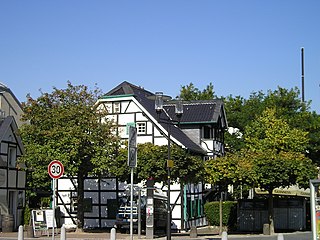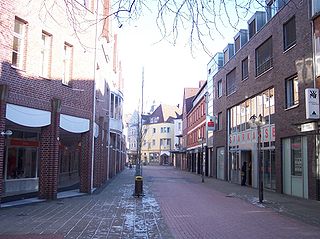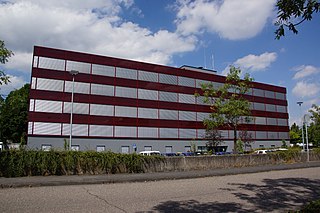
North Rhine-Westphalia or North-Rhine/Westphalia, commonly shortened to NRW, is a state (Land) in Western Germany. With more than 18 million inhabitants, it is the most populous state in Germany. Apart from the city-states, it is also the most densely populated state in Germany. Covering an area of 34,084 km2 (13,160 sq mi), it is the fourth-largest German state by size.
The Rhein-Erft-Kreis is a district in the west of North Rhine-Westphalia, Germany. Neighboring districts are Neuss, district-free Cologne, Rhein-Sieg, Euskirchen, Düren.

Erftstadt is a town located about 20 km south-west of Cologne in the Rhein-Erft-Kreis, state of North Rhine-Westphalia, Germany. The name of the town derives from the river that flows through it, the Erft. The neighbouring towns are Brühl, Kerpen, Zülpich and Weilerswist.

The Rhine-Ruhr metropolitan region is the largest metropolitan region in Germany, with over ten million inhabitants. A polycentric conurbation with several major urban concentrations, the region covers an area of 7,110 square kilometres (2,750 sq mi), entirely within the federal state of North Rhine-Westphalia. The Rhine-Ruhr metropolitan region spreads from the Ruhr area (Dortmund-Bochum-Essen-Duisburg) in the north to the urban areas of the cities of Mönchengladbach, Düsseldorf, Wuppertal, Leverkusen, Cologne, and Bonn in the south. The location of the Rhine-Ruhr at the heart of the European Blue Banana makes it well connected to other major European cities and metropolitan areas such as the Randstad, the Flemish Diamond and the Frankfurt Rhine Main Region.

Hürth is a town in the Rhein-Erft-Kreis, North Rhine-Westphalia, Germany. Hürth shares borders with the city of Cologne and is about 6 km to the southwest of Cologne city centre, at the northeastern slope of the natural preserve Kottenforst-Ville. The town consists of thirteen districts, once independent villages, and is distributed over a relatively large area. The municipal area is interspersed with lakes and stretches of forest.

Bocholt is a city in the north-west of North Rhine-Westphalia, Germany, part of the district Borken. It is situated 4 km south of the border with the Netherlands. Suderwick is part of Bocholt and is situated at the border annex to Dinxperlo.

Langenfeld is a town in North Rhine-Westphalia (Germany) in the district of Mettmann. The suburban city is located between Düsseldorf and Cologne. Langenfeld was formed from the two localities of Richrath and Reusrath and received city rights in 1948.

Delbrück is a town in the east of North Rhine-Westphalia, Germany, located in the district Paderborn.

Coesfeld is the capital of the district of Coesfeld in the German state of North Rhine-Westphalia.

Bornheim is a town in the Rhein-Sieg district, in North Rhine-Westphalia, Germany. It is situated on the West bank of the Rhine, approx. 10 km north-west of Bonn, 20 km south of Cologne.

Zülpich is a town in North Rhine-Westphalia, Germany between Aachen and Bonn. It belongs to the district of Euskirchen.

Castrop-Rauxel, often simply referred to as Castrop by locals, is a former coal mining city in the eastern part of the Ruhr Area within the state of North Rhine-Westphalia in Germany.

Wesseling is an industrial German city on the Rhine bordering Cologne city on the south. With three chemical plants and a petroleum refinery within its city limits, it has an important place in the international petrochemical industry.

Vreden is a small town in North Rhine-Westphalia, Germany near the Dutch border. The town is located near the river Berkel. The first mentioning of the town is proven for the year 839. In 1252 Vreden obtained city rights.

Lünen is a town with around 86,000 inhabitants in North Rhine-Westphalia, Germany. It is located north of Dortmund, on both banks of the River Lippe. It is the largest town of the Unna district and part of the Ruhr Area.

Rees is a town in the district of Kleve in the state of North Rhine-Westphalia, Germany. It is located on the right bank of the Rhine, approximately 20 km east of Kleve. The population in 2005 was 22,559. Founded in 1228, Rees is the oldest town in the lower Rhine area.

Bedburg-Hau is a municipality in the district of Kleve in the state of North Rhine-Westphalia, Germany. It is located approximately 5 km south-east of Kleve.

Rheinberg is a town in the district of Wesel, in North Rhine-Westphalia, Germany. It is situated on the left bank of the Rhine, approx. 10 kilometres north of Moers and 15 km south of Wesel.

Brühl station is a railway station in the city of Brühl in the German state of North Rhine-Westphalia. It consists of a passenger station and a freight yard about a kilometre to the north. Both parts of the station are on the Left Rhine line ; the freight yard also has a connection via Brühl-Vochem to the Cologne port and freight railway network.

The Schlosspark is the park of Schloss Augustusburg, a Baroque palace in Brühl, North Rhine-Westphalia, Germany. The garden was first designed in Baroque style by Dominique Girard, and established in 1728. It was partly changed to English landscape style during the 19th century. In the 1930s, the original design was restored. It is now a public park. The complete ensemble of palaces and gardens is a UNESCO World Heritage Site.




























